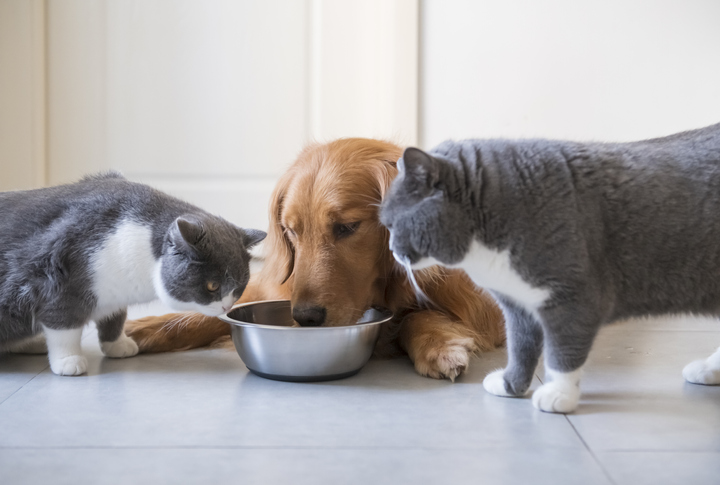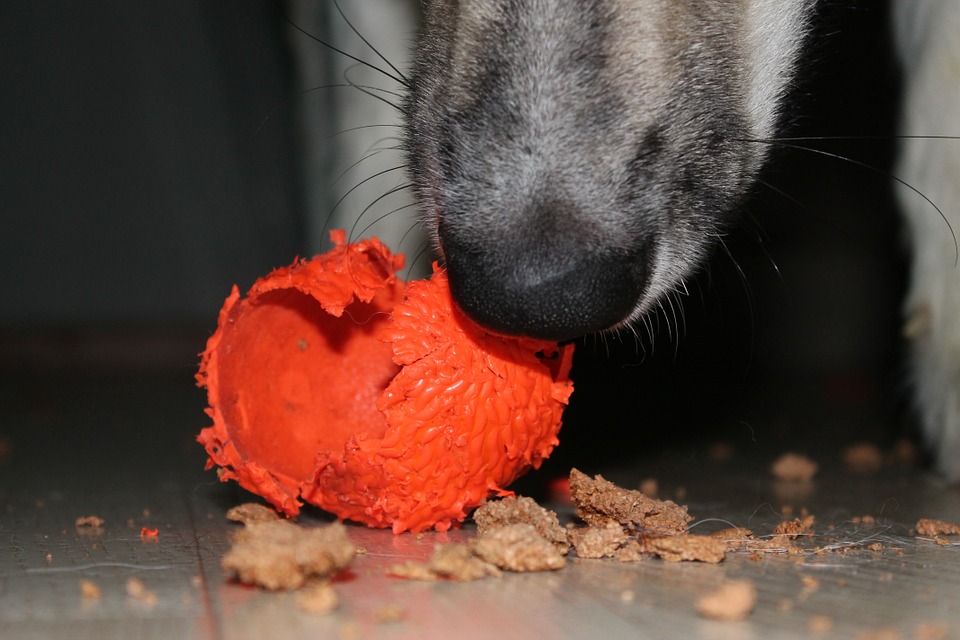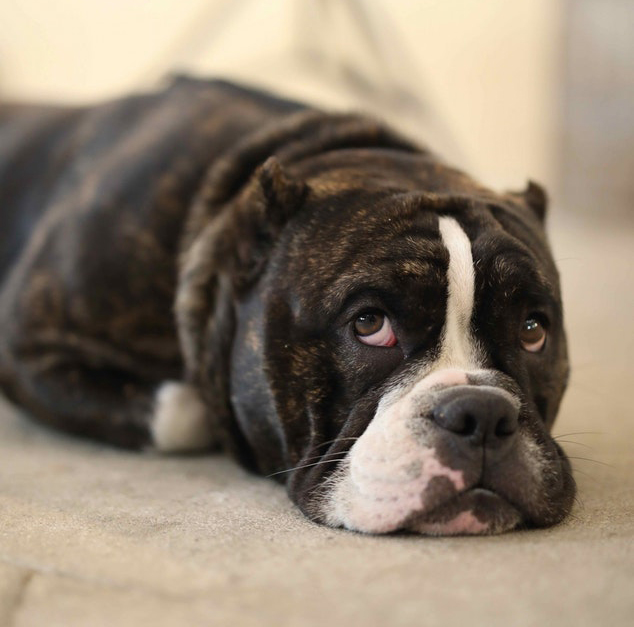
Behaviour problems in older dogs
11th May, 2021
When you’ve been together for as long as you and your older dog have, then you’ll really know each other's quirks and foibles. And just like their human owners every dog has their own personality and particular way of doing things.
But as your faithful friend gets on in years, you might notice them acting a little differently to how they used to.
Many of these changes are nothing to worry about and are just another step along their life from playful pup to senior citizen. However, if you’re getting worried about their behaviour then read our helpful guide to common behavioural problems in older dogs.
Not only will it help you figure out what’s happening, but could also point you in the right direction for further help and advice.
At Petwise, we’re the go-to specialists when it comes to providing older dogs pet insurance. We can offer cover for vet and dental fees to protect them as they age.
After all, while they may still be young at heart, as they get older their health needs are only likely to increase.
Common behaviour problems in older dogs
When you see your older dog racing to chase a ball or greet a new visitor you could be forgiven for thinking they are still a puppy. However, despite their fun-loving outlook on life, the passing years affect dogs in much the same way as they affect their human owners.
Indeed, Cognitive Dysfunction Syndrome (that’s at the root of many behavioural issues) is similar to senility or dementia in humans.
And even if the mind is willing, sometimes the body lets them down. Understanding common behaviour problems for older dogs could help you to help them live out their final years happy and content.
Loss of appetite
As natural scavengers, dogs often live for meal times – structuring their day around when they’re next going to receive a tasty treat. So, when they begin to lose interest in the sound of their dinner bowl hitting the floor, you might become concerned.
A gradual loss of interest in food can be expected for a range of reasons including a loss of sense of smell and taste, a slowing metabolism, dental problems and cognitive dysfunction.
Tips to help:
- Add something meatier to their meal to make it more appealing.
- Warming their food slightly might also increase the smell and taste. Make sure it’s not boiling hot!
- Change their food to a specially formulated senior dog food. These can provide lots of added benefits to your pooch.
- Get their teeth checked. They could be suffering from bad teeth or gums stopping them from eating.
A sudden change in eating habits or weight loss/gain could signal a more serious medical issue. Learn more about rapid weight loss in older dogs in our blog.
Older dogs are more prone to infections, liver or kidney disease and many more health issues.

Restlessness and changes to their wake/sleep cycle
One of the most common changes you’ll notice is to their wake/sleep cycle. Your dog might find it increasingly difficult to sleep normally through the night or stay awake during the day.
There are many reasons for this including eyesight or hearing loss, reduced exercise, cognitive dysfunction or medical issues making them uncomfortable.
This reversal of the sleep cycle might not be so troubling during the day. But at night they may experience anxiety or confusion and start crying, barking or pacing. This not only disturbs their sleep but yours, too. And you thought those night-time puppy wake-up calls were behind you!
Dogs can become increasingly reliant on you as they get older – so if they wake up alone in the night, they can become upset. Unless you give them that extra attention and care they crave they can become even more restless or anxious.
Tips to help:
- Speak to your vet, there could be an easily remedied medical issue.
- Increase daytime and evening activity by frequent walks.
- Playing games and practising tricks can help re-establish normal sleeping patterns.
- Stick to a strict sleep routine.
House-training problems
An upsetting problem for any older dog is if they become incontinent or start to forget their previous house-training. Even if they haven’t had an ‘accident’ since they were a pup, an older dog can start to have such problems.
There are many causes for incontinence including urinary tract issues, kidney disease, spinal problems and arthritis.
Your dog might also be suffering from cognitive dysfunction which can lead to significant memory loss. Not only might they forget familiar people or pets but also previously ingrained behaviour, learned tricks or commands.
They might also stop using body language to communicate their needs. For example, they may no longer stand by the door to indicate they have to go out to the toilet.
Tips to help:
- Treat any underlying medical issues.
- Increase opportunities for toileting.
- Encourage them outside after eating, drinking or waking up.
- Use waterproof dog bed covers or special absorbent bedding.
- Clean soiled areas with an enzymatic cleaner.
- Put puppy pads down or, in severe cases, use dog nappies.
Incontinence can make everyone’s life miserable, so figuring out what’s causing it has to be a priority. For further help, read our guide on how to cope with older dog incontinence.
Separation anxiety
As we mentioned previously, older dogs will often become more dependent on their owners.
And may even start to suffer from separation anxiety when you’re not around or you’re out of sight. Signs your faithful companion may be suffering from separation anxiety include:
- Anxiety before you leave the house. For example, pacing, panting, drooling, hiding or trembling. Read our recent blog on what heavy panting in older dogs mean!
- House soiling, destructiveness or repeated barking while you’re away.
- Destructiveness directed at windows and doors.
- Refusal to eat when left alone. Waiting until you return before they eat.
If you encounter these issues, then ask your vet to investigate whether there are any other possible medical conditions causing them. For example, house soiling could be a sign of something more serious needing treatment.
This is particularly the case if these behaviours happen while you are there as well as when you’re away.
Tips to help:
- Give your dog a ‘special’ toy to keep them entertained while you’re gone. A treat ball is a popular choice that might make losing you that bit easier.
- Help them to relax before you leave. A short walk is a good distraction but will also give them a valuable opportunity to exercise and go to the toilet.
- Identify if there’s something else triggering anxiety when you’re not there.
- Minimise disturbances while you’re away. Perhaps close the curtains so they don’t bark at strangers or other dogs walking past. Put a radio on low to muffle outside noises.
- If there has been an ‘accident’ when you return, don’t get angry with your dog. It will only upset them more and make them more anxious when you leave.
- Speak to your vet about a pheromone plug-in, spray or collar to help calm them.
While there are plenty of ways you can help your dog deal with being alone, separation anxiety often needs more input from professionals.
The RSPCA has some helpful advice on treatment for separation anxiety on their website.

Development of phobias and fearfulness
Due to deterioration of their senses and cognitive functions, senior dogs can develop new phobias or fears as they age.
These can sometimes appear from nowhere and may be a reaction to something they were never previously afraid of. For example, your dog may become fearful of loud noises such as the washing machine, doorbell, or vacuum cleaner.
Sometimes, even the most outgoing of dogs can become more fearful of the outside world. This can be difficult where your dog previously enjoyed encountering new people or other dogs.
It can even result in some senior dogs and their owners becoming housebound.
Tips to help:
- Try to keep them away from whatever is causing their fear.
- If it’s a noise, try to mask it as much as you can. Closing doors or putting on the television might be enough to calm them.
- Be patient, if they sense your irritation, it will make them even more fearful.
- Never punish them for fearful behaviour. Barking or shaking is a natural reaction and will only get worse if they become more distressed.
- Speak to a qualified dog behaviourist about mild and positive exposure to the trigger. It could be possible to teach them that there’s nothing to be afraid of.
Also, if you have our pet insurance for older dogs then you can access our 24-Hour Vet Helpline for guidance from our trained veterinary professionals.
Aggression
If your once happy-go-lucky furry friend begins to act aggressively then it can be a very upsetting experience.
They may no longer want to be petted, get more irritated by other pets and family members or behave aggressively when out and about. When you’ve been together for so long, you could be left wondering, what happened?
Older dog aggression can be down to many health conditions. They might be in physical pain or discomfort, they could be losing hearing or vision or they could be suffering from cognitive dysfunction.
If your dog is being aggressive towards family members or pets, it may also be due to changes in the home environment. Perhaps there are too many people around. Or you might have introduced a new pet to the family. Any of these can lead to fear and anxiety and ultimately aggression.
It’s important to deal with aggression before it gets worse and someone is injured. Your vet should be able to refer you to a clinical animal behaviourist.
Not only will they help identify the underlying cause but also develop a treatment plan for your dog. The RSPCA has invaluable advice on how to find a clinical animal behaviourist.
Depression
As they get older, dogs can end up feeling a bit down, too. After all, they might be feeling pain or discomfort, perhaps they’re feeling more tired or off their food.
Being unable to do things like running and playing as much as they used to is going to make anyone feel depressed.
Signs of dog depression include:
- Reduction in social interactions – Have they become more withdrawn? Do they no longer join in with exercise or games they used to enjoy?
- Loss of appetite or changed eating patterns.
- Restlessness and inability to settle.
- Other behaviour changes such as loss of toilet training, and even aggression.
Tips to help:
- Have there been any changes to their home environment? Older dogs don’t like change, and this can lead to unhappiness, so try to minimise change.
- Increase their opportunities for exercise or other mental stimulation.
- Share more quality time together.
- Are they frightened of anything? If so, remove it.
For more on symptoms and treatment for dog depression read this article from pet food experts Purina.

Disorientation
If your older dog sometimes seems disoriented when in familiar surroundings, then it could be a sign of old age.
From heading to the wrong side of a door (or being unable to find it at all) to getting stuck in corners and staring into space there are many signs they are becoming more disorientated as they age.
Tips to help:
- Make sure you stick to feeding and walking routines as much as possible to provide them with familiar structure.
- Avoid changing or rearranging furniture.
- Keep commands short and simple.
- Give them plenty of love and reassurance.
- Arrange pet insurance for older dogs to take care of any possible medical care.
Where can you find pet insurance for older dogs?
At Petwise, we believe that all dogs deserve the best care whatever their age. That’s why there’s no upper joining age limit for taking out insurance with us.
We now offer seven cover levels of pet insurance for older dogs to suit your budget and your senior dog’s changing needs. Dental cover is included as standard on all policies, and there’s a contribution towards specialist senior pet food, too.
If you ever need to make a claim, our caring UK-based team is always ready and able to help.
Finding the best pet insurance for older dogs is easy and straightforward with Petwise.
Get a quick quote today.
Policy benefits, features and discounts offered may very between insurance schemes or cover selected and are subject to underwriting criteria. Information contained within this article is accurate at the time of publishing but may be subject to change.